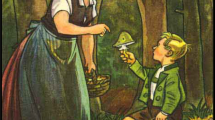Abstract
The present article examines the role of narratives in rhetoric and jurisprudence, trying to understand the ancient system of ‘issues’ (staseis), an essential part of the rhetorical curriculum in antiquity, with the help of some basic notions of legal semiotics. After a brief reconstruction of the doctrine, I argue that narratives are essential to classical rhetoric, that the basic types of issues correspond to particular stories in and of the trial, and finally that the system of ancient rhetorical theory is capable of giving an account of the narrativisation of the pragmatics of the trial. Then I turn to a cause célèbre of Roman law, the causa Curiana, trying to show that not only the trial itself but also subsequent (ancient and modern) debates concerning the case were shaped by some grand narratives, and that stories about the trial are likely to return to the court, where they may become part of the story of the trial.
Similar content being viewed by others
References
Martin, Josef. 1974. Antike Rhetorik. Technik und Methode. München: Beck.
Striller, Friedrich. 1887. De Stoicorum studiis rhetoricis [Breslauer philologische Abhandlungen 1], Breslau.
Maróth, Miklós. 1992. Die Araber und die antike Wissenschaftstheorie. Leiden: Brill.
Matthes, Dieter. 1958. Hermagoras von Temnos 1904–1955. Lustrum 3: 158–214.
Calboli Montefusco, Lucia. 1986. La dottrina degli “status” nella retorica greca e romana. Hildesheim: Olms.
Braet, Antoine. 1984. De klassieke statusleer in modern perspectief: een historisch-systematische bijdrage tot de argumentatieleer. Groningen: Wolters-Noordhoff.
Halm, Carolus. 1863. Rhetores Latini Minores. Lipsiae: Teubner.
Jackson, Bernard. 1988. Law, fact and narrative coherence. Roby, Merseyside: Deborah Charles Publications.
Braet, Antoine. 1987. The classical doctrine of status and the rhetorical theory of argumentation. Philosophy and Rhetoric 20: 79–93.
Horak, Franz. 1972. Die rhetorische Statuslehre und der moderne Aufbau des Verbrechensbegriffs. In Festgabe für Arnold Herdlitzcka, ed. Franz Horak and Wolfgang Waldstein, 121–141. München: Fink.
Bennett, W. Lance, and Feldman, Martha S., 1981. Reconstructing reality in the courtroom: Justice and judgment in American culture. New Brunswick (NJ): Rutgers University Press.
Shapiro, Barbara J. 2001. Classical rhetoric and the English law of evidence. In Rhetoric and law in early modern Europe, ed. Victoria Kahn and Lorna Hutson, 54–72. New Haven and London: Yale University Press.
Stroux, Johannes. (1949). Summum ius summa iniuria. In Römische Rechtswissenschaft und Rhetorik, 7–66. Potsdam: Ed. Stichnote.
Vaughn, John William. 1985. Law and rhetoric in the causa Curiana. Classical Antiquity 4: 208–222.
Vonglis, Bernard. 1968. La lettre et l’esprit de la loi dans la jurisprudence classique et la rhétorique. Paris: Sirey.
Jackson, Bernard. 2000. Literal meaning: Semantics and narrative in biblical law and modern jurisprudence. International Journal for the Semiotics of Law 13: 433–457.
Schittko, M.P. 2003. Analogien als Anrgumentationstyp. Vom Paradeigma zur Similitudo. Göttingen: Vandenhoeck & Ruprecht.
Winterbottom, Michael. 1982. Schoolroom and courtroom. In Rhetoric revalued, ed. Brian Vickers, 59–70. Binghamton (NY): CMERS.
Acknowledgements
I am indebted to Professor Csaba Varga, János Frivaldszky, Máté Paksy and the anonymous referees of this journal for their comments, advices and criticism.
Author information
Authors and Affiliations
Corresponding author
Rights and permissions
About this article
Cite this article
Könczöl, M. Law, Fact and Narratives in Ancient Rhetoric: The Case of the causa Curiana . Int J Semiot Law 21, 21–33 (2008). https://doi.org/10.1007/s11196-007-9054-0
Accepted:
Published:
Issue Date:
DOI: https://doi.org/10.1007/s11196-007-9054-0




